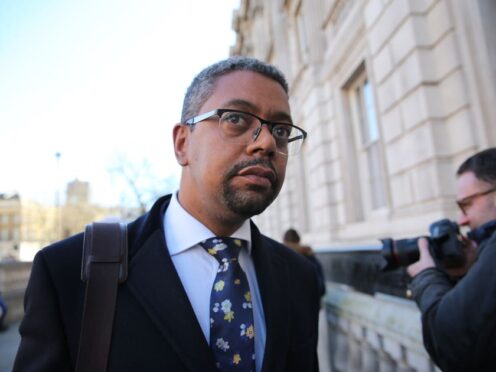
A Welsh government minister used “disappearing messages” during the pandemic, an inquiry has heard.
Vaughan Gething, one of the most senior members of the Welsh Labour Government and the former health minister, used a feature that automatically deleted WhatsApp messages after a set period of time.
Mr Gething is currently the economy minister and one of the two contenders to be the next first minister of the country.
His use of the messaging function was revealed in the UK Covid-19 inquiry on Tuesday, which is sitting in Cardiff for the next three weeks.
The inquiry is examining Welsh government decision-making throughout the health crisis.
Nia Gowman, who represents the Covid-19 Bereaved Families for Justice Cymru group, criticised the Welsh Government’s use of messaging for decision-making.
She also argued that the material disclosed to the inquiry was “belated and dubiously limited” and that denials from some within the Welsh Government, including from first minister Mark Drakeford, that they did not use tools like WhatsApp for government business do “not ring true”.
Mr Drakeford was forced to correct the record in the Senedd late last year after initially stating that he did not use the messaging platform at all.
Ms Gowman said: “The limited messages that have been disclosed, clearly show WhatsApp and text messages used to discuss Government business where they shouldn’t have been.

“They show Welsh Government senior special advisers suspiciously and systematically deleting communications.
“They show special advisers reminding themselves and others that they had agreed to ‘clear out WhatsApp chats once a week’.
“They show the most senior special adviser for the first minister for Wales and Vaughan Gething, the minister for health, turning on disappearing messages.”
Ms Gowman described deleting messages as “questionable” and contrary to the words of the first minister’s official spokesman, who said that staff were “regularly reminded of the need to maintain and retain robust records relating to decisions taken throughout the pandemic”.
Mr Gething and Mr Drakeford are due to appear before the inquiry in the coming weeks.
A Welsh Government spokesman said: We will not be commenting on matters relating to the inquiry while the hearings are underway.
“Welsh Ministers and Government officials will be giving detailed evidence in the coming weeks.
“We have made it clear that we continue to engage fully with the inquiry to ensure all actions and decisions are fully and properly scrutinised.”
Andrew Kinnier KC, who is representing the Welsh Government at the inquiry, has insisted that the Welsh government did not use WhatsApp for “decision making”.
He said: “Welsh ministers nor senior officials used WhatsApp of any other form of informal communication as substitute for, or as a supplemental means of decision-making.”
Mr Kinnier said scrutiny can be difficult, “but it is necessary”, and insisted the protecting those who were most at risk was a “major and constant consideration”, for example, older people or the “economically disadvantaged”.
He said: “There’s a higher proportion of older people in Wales than the rest of the UK and concern about the impact of the virus and the response on their health and wellbeing was of critical importance throughout.”
Mr Kinnier also quoted Mr Drakeford, who offered his condolences to everyone who had lost someone during the pandemic.
He said: “The pandemic touched the lives of everyone, my own, my colleagues, our communities, but none more so than the many families who lost loved ones.
“I want to acknowledge this loss at the outset and take this opportunity to express my personal sympathies and sincere condolences to those affected and to all who lost loved ones across all the nations.”

Enjoy the convenience of having The Sunday Post delivered as a digital ePaper straight to your smartphone, tablet or computer.
Subscribe for only £5.49 a month and enjoy all the benefits of the printed paper as a digital replica.
Subscribe